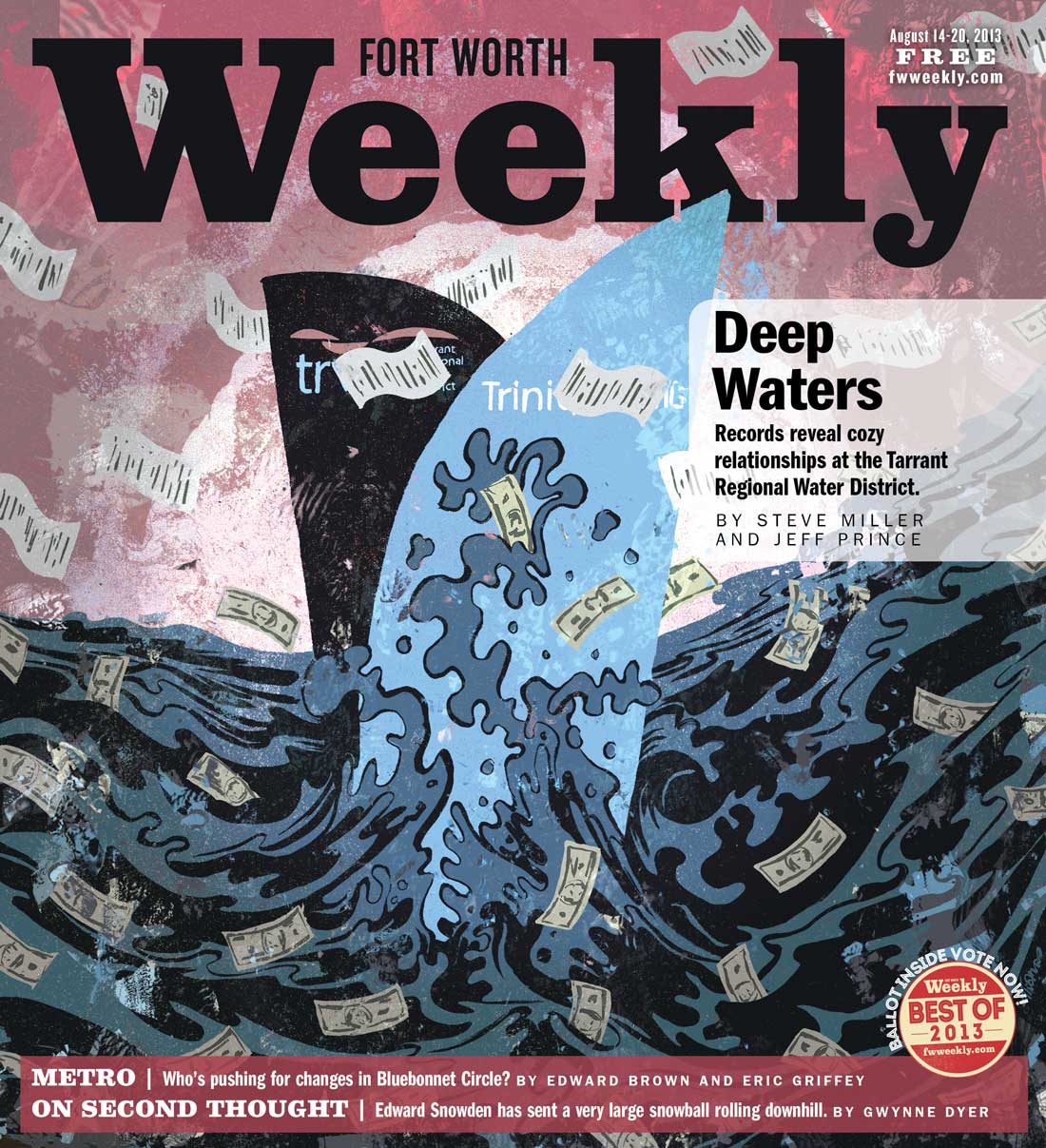In November 2010, U.S. Rep. Kay Granger finalized a deal to sell a downtown condominium to Newby Management in Fort Worth. The Fort Worth congresswoman, her son, and her mother had also sold two other condo units to the Newby firm eight years earlier. According to property records, the 2010 sale was for $450,000, and the 2002 deal was for $385,000.
After the holidays, Granger e-mailed Sandy Newby, a partner at Newby Management, to let Newby know Granger would be back in town and needed to remove some remaining items in the dwelling.
“Any day is fine,” Newby e-mailed back. Then she added, “Your Christmas gift will be waiting for you too!”
About four months later, on April 29, 2011, Newby wrote to a member of Granger’s staff on a different matter. As chief financial officer of the Tarrant Regional Water District, Newby was outlining funding requests for Trinity Uptown, part of the $900 million Trinity River Vision project that seems destined to reshape a big chunk of Fort Worth in an arc across the northern part of the central city.
Those e-mails, obtained under the state’s open-records act, reveal just the beginning of what seems to be a pattern of familial coziness at the water district. Granger’s son John Dean “JD” Granger IV, a former Tarrant County assistant prosecutor, is executive director of the Trinity River Vision Authority that guides the project. And Sandy’s husband Brian Newby, an attorney with Cantey Hanger and former chief of staff to Gov. Rick Perry, is a former member of the water district board. He served as a director from 1994 to 2004, during the years when the vast river project was getting under way, the first two condo units at 715 Jones St. were changing hands, and Sandy Newby was getting hired at the water district as an accounting manager.
But then, a certain coziness among insiders and their supporters –– and a blasé attitude toward what the public thinks of it –– have long been a mark of the Trinity project and the Grangers’ involvement. Kay Granger, the TRVA’s most valuable player, has brought $28 million in earmarked funding to the project. Her son was named to the TRVA’s top job in 2006. A restaurateur who threw the congresswoman an election party got a no-bid contract for business on TRWD land. And rumors of nepotism have dogged the district ever since.

The agency has no nepotism policy, and an attorney said it doesn’t keep track of the hiring of relatives.
The other hallmark of the project has been a distinct unwillingness by TRWD General Manager Jim Oliver and others to operate the district and the TRV project in a transparent manner. The attitude goes back at least a decade. In more recent years, records requests by reporters and members of the general public have gone unanswered or were answered long after the legal time limit set by state open-records law. Staffers have told reporters that records did not exist when they did.
Much of the substantive work of the district and the TRVA, its sub-agency, is done in committee meetings that the water district says are not covered by the open-meetings law. The recommendations of those committees are then routinely approved by the board without public discussion, a practice that is now the subject of a lawsuit. The information drought –– and the agency’s defensiveness –– have gotten so bad that Granger has refused to answer questions about the project in public forums.
With very few exceptions, officials associated with the water district and the TRVA also refused to respond to questions for this story. Neither Kay nor JD Granger, TRWD Board President Vic Henderson, director Jack Stevens, Jim Oliver, nor district CFO Sandy Newby responded to requests for interviews.
Hal Ray, of Pope, Hardwicke, Christie, Schell, Kelly & Ray, which is helping represent the district on a major lawsuit, referred questions back to water district spokesman Chad Lorance, who also did not respond to requests for information.
The agency has drawn howls of complaint for years for what some see as its abuse of eminent domain powers to take land for the TRV project and an emphasis on economic development projects while touting its questionable improvements in flood control. Now, it appears, Kay Granger has been willing to withhold support from truly critical water supply projects needed by smaller communities across the state, because those grants might compete for funds with her pet project.
The continued combativeness of Oliver and a veritable battle against releasing public documents has turned a new –– and clearly unwelcome –– light on the water board and its most massive project.
The light is even more unwelcome, it appears, because there is someone new working to widen the crack in the agency’s defensive walls. Newly elected board member Mary Kelleher is an outsider in the castle, whose first request for public records as a board member drew what she described as a chest-pounding, red-faced response by Oliver and hostility from at least some of her fellow board members.
What’s more, a millionaire Dallas hotelier, whose land is in the path of a TRWD pipeline, is suing the agency and underwriting opponents to the reigning board majority. For the first time, opposition to the river project is well funded.
The water agency is “a powerful, wealthy machine that is not going to give up control,” said Adrian Murray, who in 2010 unsuccessfully ran for a spot on the TRWD board. “Kay Granger uses this TRV as her legacy.”
********













Bravo! I’m so glad we have the FW Weekly to actually practice journalism – rather than be the typesetting service for the City of FW, TRWD and TRVA. The FW Weekly, as a news source for local government, writes circles around the FWST! An excellent piece, well researched and documented – shining a light on the TRWD and its bastard son, the Trinity River Vision. My only complaint is that there was no real mention of the $6 million spent on a lawsuit on the TRWD stealing water from Oklahoma – and losing in spectacular fashion with a rare 9-0 decision from the Supreme Court.
If there’s one thing the TRWD is good at (and it’s certainly not increasing/improving our water supply) – it’s galvanizing support against it. From Democrats to Republicans to Libertarians to Tea Partiers – heck, to the Supreme Court, there’s always a confluence of support against the poor management, power grabs, eminent domain abuses and corruption displayed by this organization. In any other town, the ‘water district’ has a ‘sleepy/low profile board” – but, in Fort Worth, the Water District Board means drama, graft, abuse, violation of open meeting laws, secrecy, nepotism – the list goes on and on. Let’s hope Mary Kelleher won’t be the lone voice of dissent on the board for long!
Thanks again for shining the light. After all, sunlight is the best disinfectant.
Wonderful article! It seems that we are learning something “new” about the Water District every week now…and certainly not good great and wonderful.
Kay Granger and Son have been using our tax money from the Tarrant Regional Water District as their own personal financial tool to fame and fortune for far too long. You keep up the good work Ms. Kelleher and perhaps we can send a few more people with this sham of a Water Board….Packing!
How about board members campaigning and advertising the completion of a trail around Marine Creek Lake? The trail is not finished, and work has stopped on the project. The boat launch at 10 Mile Bridge has not been started. Residents who access the property to use the trail will be cited for tresspassing.
The situation leaves the 25-year-old in limbo as he prepares to enter the final 12 months of his contract.